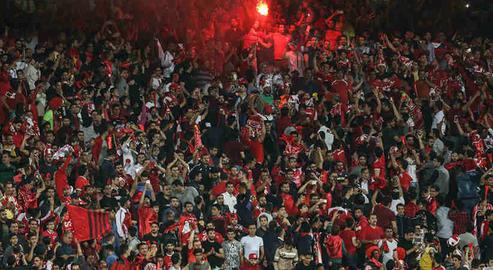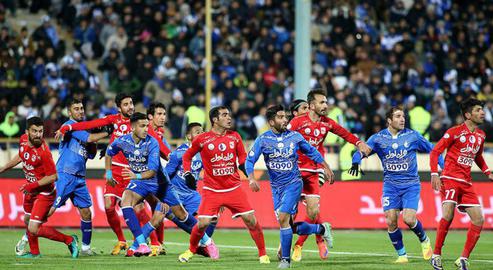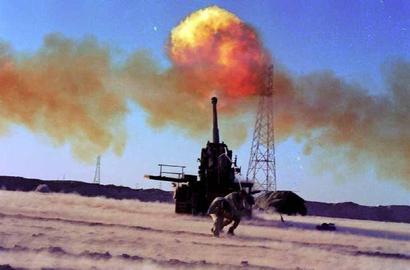The anarchic events seen in Iranian sports stadiums over the past two years have nothing in common with the interplay between sports and politics in Iran over the past two decades. Recent events are full of assault, battery, brawls, fights with the police, disorder and disobeying the law and the chanting of slogans that somethings bear no relation to sports at all.
But it is true that political and social slogans were also heard in stadiums in the years after the 1979 Islamic Revolution. The first recorded instance was February 16, 1989, at the first football matches to be held since the Revolution. The stadiums became places of protest at those matches – where political slogans turned into disgruntled and angry screams.
It was a simple event, but it turned Iran’s capital of Tehran upside-down. Two matches were scheduled, Perspolis vs. Gendarmerie in Azadi Stadium and Esteghlal vs. Pas in Shiroodi Stadium. Both the Gendarmerie and Pas clubs belonged to the security and police forces.
There was heavy rain the day before the two matches – causing floods. Referees for both games said the fields were still waterlogged and would not be ready; they asked for the games to be canceled, which was agreed. But new dates were not announced.
News of the cancelations failed to spread, and people gathered at the stadiums at the previously arranged times. They quickly saw that the matches had been called off – but did not know that it was due to the rain. The crowds assumed that the authorities had prompted the cancelations for political reasons; in their anger, they began chanting anti-regime slogans.
Hasan Ghafoorifard, the head of Iran’s Physical Education Organization at the time, claimed that Tehran’s Football Association had planned and instigated the protests so as to sully the effect of Revolution Day celebrations earlier that month. And the then-interior minister, Abdollah Noorsi, said that football was being mixed with political controversies and that such a small incident did not warrant being taken seriously. But the head of the Football Association was arrested that day along with some of the most prominent protestors.
And yet this was not the spark that lit a fire of protest through Iranian football. These early uprisings quickly petered out. Persepolis and Esteghlal, meanwhile, were also turned over to figures within the security forces for their management.
Similar instances occurred in other countries – such as Morocco, Egypt and the Ivory Coast. Famously, 30,000 Moroccan fans once chanted at a football match that “We talk to God, only he understands us. We live in this country with sorrow and pain. They raised us with narcotics, like orphans. They need to be held accountable in the next life. They ruined our talented [youth] and replaced them with addicts. They stole our wealth and made foreigners rich. They ruined the happiness, passion and kindness of our generation.”
Iranian sports stadiums can accommodate tens of thousands of people. And given that Iran’s government has banned public gatherings and protests, people from different backgrounds and parts of society have few opportunities to be next to each other. Sports matches in stadiums are one of the only places where they can speak in one voice. Security forces know this, of course, and closely monitor every match and especially the most fervent sports fans.
Twenty years after that first protest at a Persepolis match, in 2009, Persepolis was facing the Steel Azin football club when fans for both teams began a chant in support of the presidential contender Mir-Hossein Mousavi. (Mousavi had been prime minister in the 1980s and was running against the incumbent president Mahmoud Ahmadinejad.) People began chanting a popular slogan – “Ya Hossein, Mir Hossein,” echoing a traditional religious chant about the Imam Hossein with more contemporary support for Mousavi – and although some spectators tried to stifle the slogans many others were arrested by security forces.
This time, the protests did not stay in Tehran.
More than three years later, in February 2013, fans of the Teraktorsazi football club in Tabriz began chanting ethno-nationalist slogans during a match that supported minority groups such as Iranian Arabs or Turkic-background Iranians. Supporters of pan-Turkism in Azerbaijan, for instance, tried to use the occasion of a Teraktorsazi match in Tabriz to chant anti-regime slogans. Ali Daei, a famous footballer turned coach, criticized such actions at the time.
The Teraktorsazi football club was already associated with the Islamic Revolutionary Guards Corps (IRGC) – who took over in 2006 partly to help monitor activists at football matches.
In December 2017, unhappy that their club was being run by a paramilitary organization, Teraktorsazi fans protested against the IRGC during a match at the Tabriz stadium. They changed “Teraktor Nezami” – “nezami” means “military” – and demanded that the IRGC exit football.
Women were barred from attending sports matches after the 1979 Revolution – meaning that in recent years it has been only men who have been able to use matches for protests. In 2005, the “white scarves” movement began, calling for women to be allowed into stadiums; often during matches, women have gathered outside stadiums to demonstrate for their right to enter. Female fans protesting outside a volleyball match between Iran and Italy, in 2014 were arrested, with protests continuing all the way through to the championships.
Teraktorsazi fans in Tabriz re-joined the fray by adding their voice to the women’s – calling for them to be admitted to sports matches. Slogans in support of women were quickly banned from the stadium – though such bans never applied to the older ethno-nationalist slogans.
A new phase in protests at sports matches began in the first half of the 2018-2019 seasons. Over a period of three weeks, the atmosphere in stadiums grew more and more tense; at Persepolis matches, fans shouted “Death to the Dictator” and brought recent civic demonstrations from the streets into the stadiums. The slogan was the same that people had shouted earlier that year in Tehran and around the country. Teraktorsazi fans shouted the same a week later during a match at Azadi Stadium in Tehran – more than 40 of them were detained after the match.
The new wave of protests soon reached Takhti Stadium in Ahvaz. Gholamhossein Zamanabadi, Cultural Advisor to the Football Federation, said on Telegram that “Dissidents are trying to ... get people killed on the streets and in public places for no reason.” The Football Federation, it seemed, was frightened of this growing movement of protests at public matches.
Security has been intense at stadiums in Tehran and Tabriz over the past six months. But Persepolis fans continued to use matches to chant political slogans. In April, fans chanted the name of Reza Shah, Iran’s penultimate shah and a figure popularly associated now with strong and modern government. The chants came during an event that usually involves chants of the football club manager’s name – except on this occasion it was the name of the Pahlavi dynasty founder.
“God bless Reza Shah” has since turned into a common chant at Persepolis matches – and even as fans leave the stadium. Similar incidents have been reported at matches in Isfahan.
Iranian football stadiums have become sites of protest and one of the few releases for demonstrations that have been suppressed over years. The last matches of the season will again present new occasions for protest, and place fresh demands on the security forces. The question will remain – can they stop the protests this time?
visit the accountability section
In this section of Iran Wire, you can contact the officials and launch your campaign for various problems


























comments